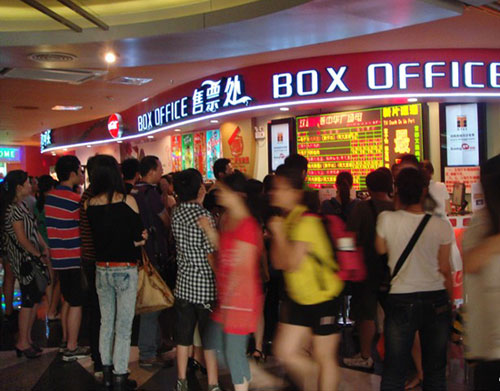50 billion yuan 'stolen' from China’s box office
- By Zhang Rui
 0 Comment(s)
0 Comment(s) Print
Print E-mail China.org.cn, January 23, 2014
E-mail China.org.cn, January 23, 2014
One film company executive has said that at least 5 billion yuan (US$826 million) was stolen from China's total box office statistics. A new set of rules to help cinemas battle this type of fraud has now been issued.
|
One film company executive has said that at least 5 billion yuan (US$826 million) was stolen from China's total box office statistics. [File photo] |
The film bureau under the State General Administration of Press, Publication, Radio, Film and Television, China's movie watchdog, confirmed on Wednesday that it had issued a circular containing the new rules.
China's film industry has been suffering from this kind of theft, especially in second- and third-tier cities. Moviegoers sometimes find they have received entrance tickets different from those they actually ordered online; a number of companies and institutions can take staff to see a film without using any tickets which should be put into the sales system; and so the list continues. These types of fraud are often facilitated through the use of illegal ticketing software offering double systems to cheat actual box office sales.
Wang Changtian, president of China's fastest-growing private media entertainment company Enlight Media, said at least 5 billion yuan went missing in 2013. He said China's total box office income should in fact have surpassed 26 billion yuan (US$4.29 billion). In previously published official statistics, Chinese box offices had grossed 21.79 billion (US$3.6 billion) in total.
Wang added that if film releasers did not make a profit, they would have no funds to make more movies; a vicious circle of film development.
Huang Ziyan, vice president of Le Vision Pictures' distribution and marketing arm, also complained about the ticket sale structure, adding, "One ticket and one bucket of popcorn sell for 80 yuan, but theaters said the film ticket only costs 20 yuan and the other 60 yuan are for popcorn. How can you reason with them? "
"We distributors have to have a good relationship with theaters in the long-term and we are not law enforcers, so we cannot do that much to fight them," Huang continued, "The only thing we can do is to close an eye."
Earlier this month, the watchdog defined a standard regarding the technicalities of managing cinema ticket sales as to prevent tax evasion through the falsification of numbers of moviegoers and the reporting of artificially reduced ticket sales.
The circular outlined five approaches to battle fraud, said Mao Yu, vice director of the film bureau.
The first one is to strictly regulate and perfect the ticketing software system. All national ticketing software must be upgraded before May, whereas the local theaters’ software upgrade has to be completed by October. Disqualified software will not be allowed. An upgrade to the national digital ticketing platform will be completed by that date and all commercial cinemas must upgrade or otherwise face a ban from operations.
On a second note, the local film administration department should regularly check the ticketing system and forbid cinemas to switch to any other unapproved software which can hide the actual ticket sale data.
The third rule states: no fake tickets, no alternative tickets. The film title on the ticket paper must be that of the film visitors want to see. The circular also noted in this regard that a number of pirating activities must be traced and banned.
"Some theaters have invited movie pirates to record the film [inside the theater] and subsequently create a DVD to sell. Some theaters make their own copies which they then give to lower-level county theaters," Mao said, adding some theaters also illegally screened Blu-ray, DVD and internet downloads on their big screens.
The fourth regulation demands that film distributors, inspecting associations and companies conduct routine inspections of cinemas and report those which break the rules whenever and wherever they are discovered.
The fifth and final rule then invokes harsher punishments: all persistent or severe offenders may have their licenses revoked.
"The standards for ticket management can be further improved this year," said Zhang Hongsen, head of the film bureau, "We will make more efforts to crack down on illegal behavior and make them disappear from the film market."
Zhang Zhao, CEO of Le Vision Pictures, also expressed his hopes for more legislation, "The circular is great, but it doesn't end here. We see it as the first step, but we also need laws to regulate Chinese film market."







Go to Forum >>0 Comment(s)